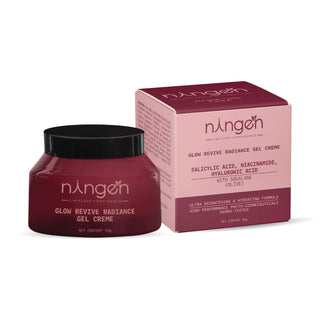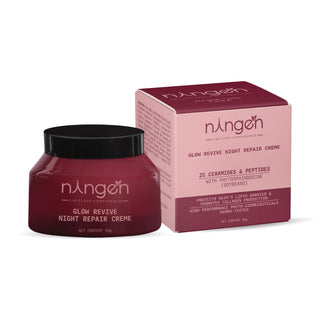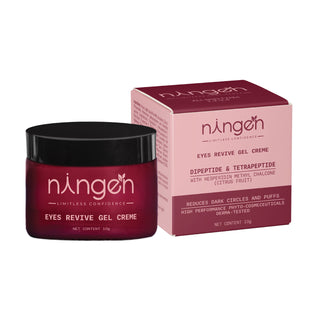TLDR;
A Gel vs. Cream Moisturizer comparison helps you understand which formula best suits your skin. Gels are lightweight and water-based, ideal for oily or acne-prone skin. Creams are richer and deeply hydrating, perfect for dry, sensitive, or mature skin. This guide breaks down textures, ingredients, pros and cons, and helps you choose the right moisturizer for your skin type and climate.
In the vast world of skincare, moisturizers are arguably the most fundamental step. They are the guardians of your skin barrier, locking in hydration, preventing water loss, and keeping your complexion supple and healthy. But a common dilemma arises when you step up to the beauty counter or browse online: should you opt for a gel or a cream? This isn't just a matter of personal preference; it’s about understanding the core difference between gel & cream formulations and how they interact with your unique skin.
For many, Gel vs. Cream Moisturizer can feel overwhelming, leading to trial and error that sometimes results in breakouts, dryness, or simply dissatisfaction. But fear not! By the end of this comprehensive guide, you’ll be equipped with all the knowledge needed to confidently select the moisturizer that’s perfectly suited for your skin’s needs, helping you achieve that radiant, healthy glow you’ve always wanted. Let's dive deep into the world of hydration!
In this Guide;
Gel vs. Cream Moisturizer Texture and Composition
Who Should Use a Gel Moisturizer?
Who Should Use a Cream Moisturizer?
A Practical Guide to Choosing Your Best Match
The Fundamental Differences: Gel vs. Cream Moisturizer Texture and Composition
The most immediate and noticeable difference between cream & gel moisturizer lies in their texture and consistency. This difference stems directly from their primary composition and the ingredients used to achieve their unique feel and function.
Gel Moisturizers: The Lightweight Hydrators
Imagine a moisturizer that feels like a splash of cool water on your skin; that's often the experience of a gel moisturizer.
Consistency & Texture: Gels are typically translucent or semi-translucent, with a lightweight, almost jelly-like consistency. They feel cool and refreshing upon application and spread easily without leaving a heavy residue. The gel vs cream moisturizer texture comparison here is stark; gels are far less viscous.
Composition: Primarily water-based, gels contain a higher percentage of water and humectants (ingredients that attract moisture from the air, like hyaluronic acid or glycerin). They have a very low oil content, if any at all.
Absorption: They absorb into the skin incredibly quickly, often within seconds, leaving a matte or slightly dewy finish without any stickiness or greasiness.
-
Key Ingredients: Beyond water, you'll often find hyaluronic acid, aloe vera, glycerin, various plant extracts, and sometimes salicylic acid or niacinamide in gel formulations. These ingredients work to hydrate, soothe, and often provide additional benefits like pore refinement or sebum control.
Cream Moisturizers: The Rich Nourishers
Cream moisturizers are the classic choice, known for their comforting and protective feel.
-
Consistency & Texture: Creams are opaque, ranging from a light lotion-like consistency to a thick, buttery balm. They feel richer and more substantial than gels. The gel vs cream moisturizer texture here is much denser and more emollient.
-
Composition: Creams are emulsions, a mixture of oil and water, with a higher oil content than gels. They often contain a blend of emollients (ingredients that soften and smooth skin, like ceramides or fatty acids) and occlusives (ingredients that form a protective barrier to prevent water loss, like petrolatum or dimethicone).
-
Absorption: Creams tend to take a little longer to absorb and often leave a slightly dewy or satin finish, sometimes with a protective layer sensation.
-
Key Ingredients: Look for ingredients like ceramides, fatty acids, cholesterol, shea butter, cocoa butter, squalane, various oils (jojoba, argan, sunflower), and petrolatum. These ingredients are fantastic for restoring the skin barrier and providing deep, lasting moisture.
Key Texture & Consistency Differences: Gel Moisturizer vs. Cream Moisturizer

Who Should Use a Gel Moisturizer? (Pros & Cons)
Understanding the pros and cons of gel moisturizers will help you determine if they are your skin's perfect match.
Pros of Gel Moisturizers:
-
Ideal for Oily & Acne-Prone Skin: Their low oil content means they are less likely to clog pores or contribute to excess shine, making them a godsend for those battling oiliness and breakouts.
-
Lightweight & Non-Greasy: They feel virtually weightless on the skin, making them comfortable to wear, especially in humid climates or during warmer months.
-
Quick Absorption: Perfect for those who are always in a rush or dislike the feeling of product sitting on their skin. They layer beautifully under makeup or sunscreen.
-
Cooling & Refreshing: Many gel formulations provide an immediate cooling sensation, which can be particularly soothing for inflamed or irritated skin.
-
Less Likely to Cause Pilling: Due to their quick absorption, they tend to cause less pilling when layered with other skincare products.
Cons of Gel Moisturizers:
-
May Not Be Enough for Very Dry Skin: While hydrating, the lack of occlusive oils means they might not provide sufficient barrier support or long-lasting moisture for severely dry or compromised skin.
-
Can Evaporate Quickly: The high water content can mean that the hydrating effects, if not supported by strong humectants and a healthy barrier, might not last as long as a cream for some individuals.
-
Limited Emollient & Occlusive Benefits: They offer fewer benefits in terms of intensely softening dry patches or creating a robust protective seal against environmental aggressors.
Who Should Use a Cream Moisturizer? (Pros & Cons)
Cream moisturizers are a classic for a reason, offering robust hydration and barrier support.
Pros of Cream Moisturizers:
-
Excellent for Dry & Dehydrated Skin: The rich blend of oils, emollients, and occlusives provides intense and long-lasting hydration, replenishing lost moisture and preventing further water loss.
-
Ideal for Mature Skin: Mature skin tends to be drier and can benefit from the extra nourishment and barrier support creams provide, which can help minimize the appearance of fine lines and wrinkles.
-
Soothes Sensitive & Compromised Skin: The protective barrier formed by creams can help shield sensitive skin from irritants and aid in the repair of a damaged skin barrier.
-
Provides a Protective Barrier: The occlusive ingredients help to seal in moisture and protect the skin from harsh environmental elements like cold winds and dry air.
-
Versatile in Climate: While heavier, many people with normal to combination skin can use lighter cream formulations, especially during colder, drier months.
Cons of Cream Moisturizers:
-
Can Feel Heavy or Greasy: Their rich texture might feel too heavy or occlusive for oily or acne-prone skin, potentially leading to clogged pores and breakouts.
-
Slower Absorption: They take more time to sink into the skin, which might not be ideal for those who prefer a quicker routine or want to apply makeup immediately.
-
May Cause Pilling: If not properly absorbed or if too much is applied, creams can sometimes pill when layered with other products or makeup.
-
Risk of Clogging Pores (for certain skin types): For individuals prone to congestion, the higher oil content can be problematic.
The Hybrid Solution: What About Gel Cream or Gel-Based Cream?
You might have noticed another category emerging on shelves: "gel cream" or "gel-based cream." This formulation is an interesting bridge between the two traditional types, aiming to offer the best of both worlds.
-
What it is: A gel cream typically has a lighter texture than a traditional cream but offers more richness and emollience than a pure gel. It's often formulated with a higher water content than a cream but still includes beneficial oils and emollients to provide sustained hydration and barrier support without feeling heavy.
-
Who it's for: This hybrid is fantastic for:
-
Combination Skin: Provides hydration to drier areas without overwhelming oilier zones.
-
Normal Skin: Offers balanced moisture that feels comfortable year-round.
-
Slightly Oily Skin that Needs More Nourishment: If a gel isn't quite enough but a cream is too much, a gel cream can be the perfect compromise.
-
Those in Humid Climates: When you need a bit more than a gel but a cream feels too heavy.
Gel creams are a testament to how cosmetic science is constantly evolving to meet diverse skin needs, offering a versatile option for those who don't fit neatly into the "oily" or "dry" categories.

Choosing Your Perfect Match: A Practical Guide
Now that you understand the gel vs cream moisturizer texture and the comprehensive difference between gel & cream moisturizer, how do you make the ultimate decision?
-
Identify Your Skin Type:
-
Oily/Acne-Prone: Lean heavily towards gel moisturizers. Look for non-comedogenic formulas.
-
Dry/Very Dry: Cream moisturizers will be your best friend. Look for ingredients like ceramides, shea butter, and hyaluronic acid.
-
Combination: Consider a gel cream or use different moisturizers for different areas (e.g., gel on T-zone, cream on cheeks).
-
Normal: You have the most flexibility! A gel cream might be perfect, or a light cream in winter and a gel in summer.
-
Sensitive: Both types can work, but focus on fragrance-free, hypoallergenic formulas. Creams might offer more soothing barrier support.
-
Consider the Climate:
-
Hot, Humid Climates: Gels are usually preferred for their lightweight feel and quick absorption.
-
Cold, Dry Climates: Creams are often necessary to provide extra protection against harsh elements and prevent moisture loss.
-
Think About Your Routine:
-
Do you layer many products? A quick-absorbing gel might be easier.
-
Do you apply makeup soon after? Gels and gel creams tend to sit better under foundation.
-
Listen to Your Skin: Ultimately, your skin will tell you what it likes. Does it feel tight after a gel? It might need a cream. Does it feel greasy after a cream? Try a gel or gel cream.
Also read: How to determine your skin type?
Final Insights
The debate of gel vs cream moisturizer isn't about one being inherently "better" than the other. It's about finding the ideal formulation that harmonizes with your skin's unique needs, your environment, and your personal preferences. By understanding the fundamental difference between cream & gel moisturizer, their pros and cons, and even the benefits of hybrid gel creams, you are now empowered to make an informed decision.
Invest in your skin by choosing the right hydration partner, and watch as your complexion transforms into its healthiest, most radiant self. Happy moisturizing!
Frequently Asked Questions
Q1: What is the main difference between a gel and a cream moisturizer?
The main difference lies in their base and oil content. Gels are primarily water-based with little to no oil, making them lightweight. Creams are oil-in-water emulsions with a higher oil content, making them richer and more emollient.
Q2: Which moisturizer is better for oily and acne-prone skin?
Gel moisturizers are generally better for oily and acne-prone skin due to their lightweight, non-comedogenic, and low-oil formulations, which help to hydrate without clogging pores or adding excess shine.
Q3: Which moisturizer is best for dry and mature skin?
Cream moisturizers are ideal for dry and mature skin as they provide intense hydration, rich emollients, and occlusive properties to strengthen the skin barrier and prevent moisture loss.
Q4: Can I use both a gel and cream moisturizer?
Yes, absolutely! Many people use both, applying a lighter gel in the morning under makeup and a richer cream at night for intensive repair, or using different types on different areas of combination skin.
Q5: What is a "gel cream" and who is it for?
A gel cream is a hybrid formulation that offers a lighter texture than a traditional cream but more richness than a pure gel. It's great for normal, combination, or slightly oily skin that needs balanced hydration without a heavy feel.
Q6: Do gel moisturizers really hydrate as well as creams?
Yes, gel moisturizers can be very hydrating, especially if they contain potent humectants like hyaluronic acid. However, for very dry skin, they may lack the occlusive ingredients found in creams that provide long-lasting barrier protection.
Q7: Will a gel moisturizer make my skin feel tight?
A well-formulated gel moisturizer should not make your skin feel tight. If it does, it might not be providing enough moisture for your skin type, or your skin barrier could be compromised, suggesting you might need a richer formula or to layer with a serum.
Q8: Can I use a cream moisturizer in the summer?
Yes, you can. While many prefer gels in summer, if your skin is dry or you're in an air-conditioned environment, a lighter cream can still be appropriate. Listen to your skin and choose what feels comfortable and effective.
Q9: What ingredients should I look for in a gel moisturizer?
Look for hyaluronic acid, glycerin, aloe vera, niacinamide, and various antioxidants.
Q10: What ingredients should I look for in a cream moisturizer?
Key ingredients include ceramides, fatty acids, cholesterol, shea butter, squalane, and various beneficial oils.
References & further studies:
Healthline – Gel vs Cream Moisturizer Basics
https://www.healthline.com/health/beauty-skin-care/moisturizer-types
NCBI (National Center for Biotechnology Information)
https://www.ncbi.nlm.nih.gov/books/NBK545171
American Academy of Dermatology (AAD)
https://www.aad.org/public/everyday-care/skin-care-basics/dry/pick-moisturizer











